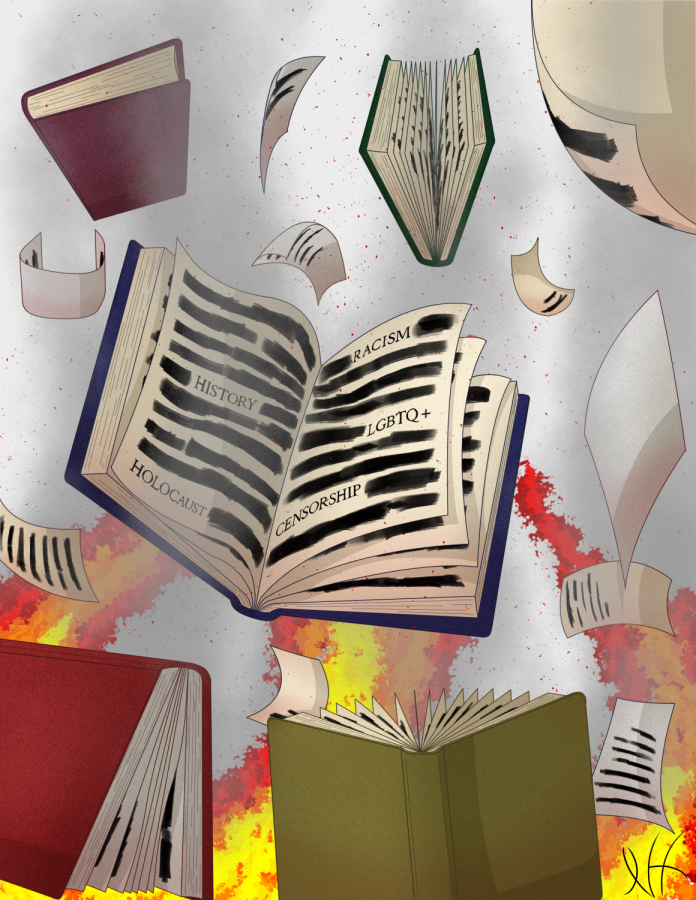Erasing our history
The looming threat of censorship within books in school districts
Censoring important issues by banning books limits the perspectives and world view of students nationally.
February 25, 2022
Novels like “Fahrenheit 451,” “1984” and “To Kill A Mockingbird” have been read, analyzed and discussed for decades. While including a variety of subject matters, these books have been challenged by school districts nationally to determine whether or not the content is suited for learning environments and libraries despite the merit they possess.
According to the American Library Association, just within the first couple of months in the 2020 school year, more than 273 books were challenged or banned. Though the banning of books has not posed a threat to Millard Public Schools specifically, students need to recognize the significance of the conversations these books initiate and why book banning threatens the perspectives of younger generations.
Problems arise within the idea of restricting books when literature is pulled from curriculums despite the lessons it holds. Issues like sex, violence, racism and political viewpoints are typically the most challenged topics when it comes to proposing a ban on a book according to the ALA. Art Spiegelman’s “Maus,” a graphic novel sharing a story about the impacts of the Holocaust, was recently banned from being taught within a Tennessee school district after arguments arising around the use of language and nudity. The Holocaust itself is disturbing, and it’s expected for nudity surrounding it to align with the grueling nature of the Holocaust itself.
Even when it comes to topics like the Holocaust, literature provides students a safe way to learn and process such a devastating event without placing them directly in that situation. This can be applied to many other topics such as matters revolving around race. Despite the effectiveness of the storytelling in books like Harper Lee’s “To Kill a Mockingbird” is criticized and challenged in school districts for themes involving racism and sex. Most students read this book early in high school and with the guidance of teachers, they were able to comprehend and start understanding and talking about these timeless issues within a classroom environment. Teaching about these issues allows the growing generation to recognize the depth behind racism, slurs and rape and how to handle it as they mature.
When it comes to explicit scenes, it’s reasonable to think that they shouldn’t be taught to younger and less mature classes. On the other hand, older classes exploring these topics in a controlled environment allow a guided analysis and discussion. The listed issues are real problems that communities, families and even some students face, so sharing these perspectives is crucial to forming well-rounded adolescents.
Even though these novels are impactful, they aren’t perfect. “To Kill a Mockingbird” does a great job at introducing racism, but critics recognize the white savior complex in the novel. Instead of scrapping the book completely, English classes can equip their teachers with the necessary training to initiate conversations regarding this portrayal of racism and a white savior complex. Understanding the fine line between excessive use of slurs, racism and aged ideologies can help facilitate the novels being taught within English classes and how to address these issues. In my experience, discussing real-world problems like this in the classroom has conditioned me to acknowledge and understand differing perspectives while developing my own. Changing the curriculum to books with “easier” topics to digest leads to depriving students of these experiences, making them less prepared for the nuance of the real world.
With meticulously selected novels, it’s expected for books not to age gracefully with the current time leading to a revision of the curriculum. A good example of revision is replacing the book “Adventures of Huckleberry Finn” by Mark Twain. With slurs being used 203 times within the 366-page novel, it made students uncomfortable and feel marginalized, leading to the book being taken out or not being required in the curriculum. When it comes to revisions, it’s important to understand the difference between censoring issues and replacing aged novels with more recent literature that better represents the same issues of civilization, race and prejudice. Not requiring the teaching of this book isn’t an instance of political correctness; instead, it allows these topics to be explored without marginalizing groups within the classroom. Even though recognizing classic novels is important, selecting recent literature focused on these themes will make it easier for students to process these topics while in a learning environment.
Book censorship hasn’t plagued the English curriculums within Millard. The school district goes through an extensive process when deciding the eligible books to be taught. Approval must be given by a student, educator and community member before being added to the curriculum. A process like this ensures that the book isn’t marginalizing students and gets the opinions from multiple perspectives. If a book is chosen, high school English classes have a pool of books regarding certain topics to choose from, allowing the teachers to have some freedom concerning the books they want to and are comfortable with teaching within a classroom. Though a book hasn’t been challenged within the Millard School District, I imagine the challenged book will face a similar process to reevaluate whether or not the book is suited for curriculums.
Literature allows students to delve deep into stories that share perspectives and events that students would have not otherwise considered. Exploring these books within English classes allows students to widen their horizons and investigate the world all within the safety of the classroom. Making sure literature that represents current issues must delicately be taught to ensure education while creating a safe space for the groups that face these issues. Addressing heavy topics can’t be avoided when facing historical novels, and it is crucial to ensure that school districts aren’t erasing perspectives taught within said novels.







